八年级英语上册Unit5Canyoucometomyparty教案示例人教新目标版
- 格式:pdf
- 大小:385.58 KB
- 文档页数:5
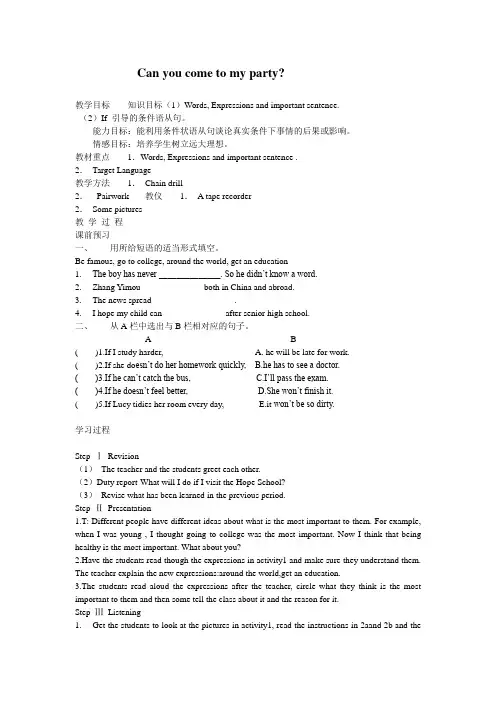
Can you come to my party?教学目标知识目标(1)Words, Expressions and important sentence.(2)If 引导的条件语从句。
能力目标:能利用条件状语从句谈论真实条件下事情的后果或影响。
情感目标:培养学生树立远大理想。
教材重点1.Words, Expressions and important sentence .2.Target Language教学方法1.Chain drill2.Pairwork 教仪1.A tape recorder2.Some pictures教学过程课前预习一、用所给短语的适当形式填空。
Be famous, go to college, around the world, get an education1. The boy has never ______________. So he didn’t know a word.2. Zhang Yimou______________ both in China and abroad.3. The news spread___________________.4. I hope my child can______________ after senior high school.二、从A栏中选出与B栏相对应的句子。
A B( )1.If I study harder, A. he will be late for work.( )2.If she do esn’t do her homework quickly, B.he has to see a doctor.( )3.If he can’t catch the bus, C.I’ll pass the exam.( )4.If he doesn’t feel better, D.She won’t finish it.( )5.If Lucy tidies her room every day, E.it won’t be so dirty.学习过程Step ⅠRevision(1)The teacher and the students greet each other.(2)Duty report-What will I do if I visit the Hope School?(3)Revise what has been learned in the previous period.Step ⅡPresentation1.T: Different people have different ideas about what is the most important to them. For example, when I was young , I thought going to college was the most important. Now I think that being healthy is the most important. What about you?2.Have the students read though the expressions in activity1 and make sure they understand them. The teacher explain the new expressions:around the world,get an education.3.The students read aloud the expressions after the teacher, circle what they think is the most important to them and then some tell the class about it and the reason for it.Step ⅢListening1. Get the students to look at the pictures in activity1, read the instructions in 2aand 2b and thesentences in the box in activity2b. Try to guess the content of the listening materials.2. Play the recording for the students to listen and write “A”or “P” before theexpressions in activity1.3. Play the recording again for them to listen and complete the sentences in activity2b.4. Get the students to turn to page89, read the listening materials and then check the answers.5. Plactice the conversation, chang the roles and practice again.Step ⅣPairwork1. Role play a conversation.StudentA is a friend. StudentB is Michael in activity2a. Give Michael advice.2.Ask a few students to talk about their advice..Step ⅤSummarySay, In this class, first we’ve learned two new key words, exprassion s and important sentences.Then we’ve learned how to talk about the consequences with an if-clause.Step ⅥHomework1. Revise the key words and expressions.2. Preview Self Check and Review of units1 to 5.课内训练巩固单项选择()1.If you ‘re a famous star,people will_________ you all the time.A.watchB.seeC.look atD.look for( )2.If you work hard, you can_________a lot of money.A.doB.bringC.takeD.make( ) 3.Poor families don’t often have money___________ education.A.atB.byC.ofD. for( )4.I want to know something____________ I don’t know.A.whichB./C.whatD.who四:课后巩固(一).句型转换,每空一词。

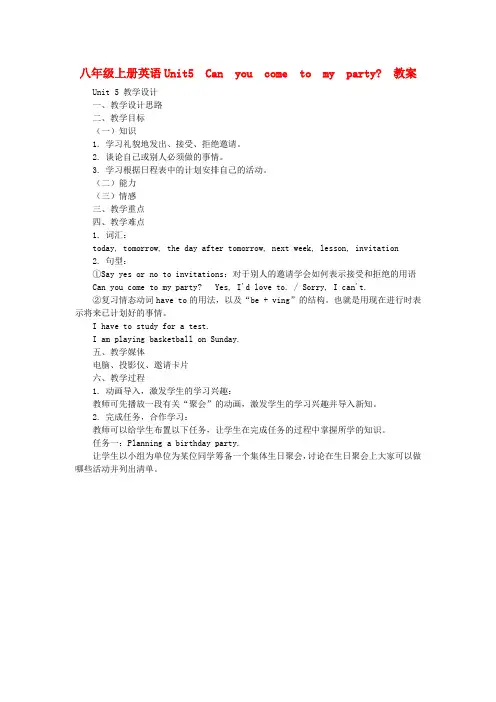
八年级上册英语Unit5 Can you come to my party? 教案Unit 5 教学设计一、教学设计思路二、教学目标(一)知识1. 学习礼貌地发出、接受、拒绝邀请。
2. 谈论自己或别人必须做的事情。
3. 学习根据日程表中的计划安排自己的活动。
(二)能力(三)情感三、教学重点四、教学难点1. 词汇:today, tomorrow, the day after tomorrow, next week, lesson, invitation2. 句型:①Say yes or no to invitations:对于别人的邀请学会如何表示接受和拒绝的用语Can you come to my party? Yes, I'd love to. / Sorry, I can't.②复习情态动词have to的用法,以及“be + ving”的结构。
也就是用现在进行时表示将来已计划好的事情。
I have to study for a test.I am playing basketball on Sunday.五、教学媒体电脑、投影仪、邀请卡片六、教学过程1. 动画导入,激发学生的学习兴趣:教师可先播放一段有关“聚会”的动画,激发学生的学习兴趣并导入新知。
2. 完成任务,合作学习:教师可以给学生布置以下任务,让学生在完成任务的过程中掌握所学的知识。
任务一:Planning a birthday party.让学生以小组为单位为某位同学筹备一个集体生日聚会,讨论在生日聚会上大家可以做哪些活动并列出清单。

新目标英语八年级上Unit 5 Can you come to my partyPeriod 1 & 2教案教材分析:本单元主要内容是学习如何礼貌地发出,接受,拒绝邀请;谈论自己和别人的义务和责任.;学习如何安排好日程表同时根据日程表中的计划安排自己的活动。
教学理念分析: Go for it 新目标英语,实行的是新课程标准,采用的是任务型语言教学(Task–Based Language Teaching)模式,教学设计和教学过程,应充分发挥学生的主体地位,教师的主导作用,创造设计切实可行的真实的语言交际情景和任务,让学生体验、实践、使用目标语,进行交际和解决问题——完成任务,让学生传达信息和体验成就感,增加兴趣,真正落实教学情景化和教学步骤交际化原则,落实在做中学、用中学、学中用的原则.教学目标:1.知识目标:a.学习,理解掌握和运用以下单词: lesson calendar tomorrow invitation whole till inviteb.学习,理解掌握和运用以下词组 baseball game ;football match; the day after tomorrow; the day before yesterday ;come over to, have a piano lesson another(next) timec.学习,理解掌握和运用以下句子:Can you come to my party? Can he/she go to the baseball game? Can they go to the concert? Sorry , I can’t. Sure, I’d love to./ Great. I’d love to. Come and have fun. Come and join us. Maybe another /next time. Thank you for asking/inviting me/your invitation.2能力目标a.能礼貌的发出,接受.拒绝邀请b.能谈论已有的计划或安排c.能用情态动词have tod.能用现在进行时表示将来计划或安排.3情感目标a.通过小组活动和合作,在多种英语学习情景中用英语交流互帮互助b.互相邀请学会相互关心和体谅教学重点和难点1本单元的重要词汇和句型.2如何发出.接受拒绝邀请3,如何写邀请卡和邀请信4如何写电子邮件或便条来回复邀请.课时安排:4课时,本教案例是Section A的两课时Teaching proceduresPeriod 1(Section A 1a-2c)Step1.Warm-up(课前热身,激发学生兴趣)T: What weekend activities do you know? Make a list.Ss: Study for a test/ go to a movie /have a piano lesson /surf the internet/ help my mother /visit my grandfather /play basketball and so on.让学生把所知活动写在黑板上,这样既为下一步要用到活动名提供了选择和参考,又让学生学习以前知识且能体验到成就感,兴趣大增,在列举的基础上补充如Go to the doctor /go to the baseball game/ have a guitar lesson 等且写在黑板上.Step 2导入新课T; What activities do you want to do this weekend?S:I want to …T: What activities do you not want to do?S:I don’t want to study for a test/…T; Yes, you don’t like these activities but you have to do them.把句型You have to do something.写在黑板上,这样导入了表示拒绝的重点句型 I have to…然后问学生是否能参加我的生日晚会(晚会时间各不相同有上课时,周末等)回答中必然有肯定和否定两种,帮助学生回答完整且把下列对话写在黑板上.A: Can you come to my party?B: Sure , I’d love to .Thanks for asking.Sorry I can’t. I have a piano lesson/have too much homework…I’m sorry , I can’t . I have to help my mother./go to the doctor.I’m sorry , I can’t. I’m playing soccer./going to the movies.这样表示拒绝的三种理由表达法都呈现出来了,.下一步学生就会使用以上三种句型来拒绝邀请.Step 3 Pairwork(2c)Task: Give and accept or decline invitations in pairs like2c.Then ask several pairs to act out their conversations.此任务是学以致用,利用以上所学来向对方提出或拒绝或接受邀请,这样一来学生在使用目标语中慢慢掌握了本节课重点内容.Step4 Groupwork当最后两组学生互相邀请时,随后问全班同学Can he /she come to his or her party ?Help them to answer .No he /she can’t. He /She has a football lesson /has to help her mother/is surfing the Internet. Then ask the class to ask and answer in threes to practice following conversations.A: Can you go to the movies?B: Sorry, I can’t . I have to go to the doctor.C: Can he go to the movies?A: No he can’t .He has to go to the doctor.通过练习会话,操练和掌握了第三人称的相关内容.Step5 Invitation and reportTask1: Invite five classmates to a concert.Task2: Report the result.假设马上有一个音乐会,六人为一组,一人邀请其余五人同去,然后汇报邀请结果,这样学中用,用中学既练习如何发出,接受和拒绝邀请,同时练习了用第三人称汇报邀请结果.Step6 ListeningTask: Listen to 1b,2a&2b and finish the exercises in them.在训练熟练的基础上再做听力,既能起到再次训练和巩固的作用,有能让学生体验到成功的喜悦,提高学习兴趣和听力。
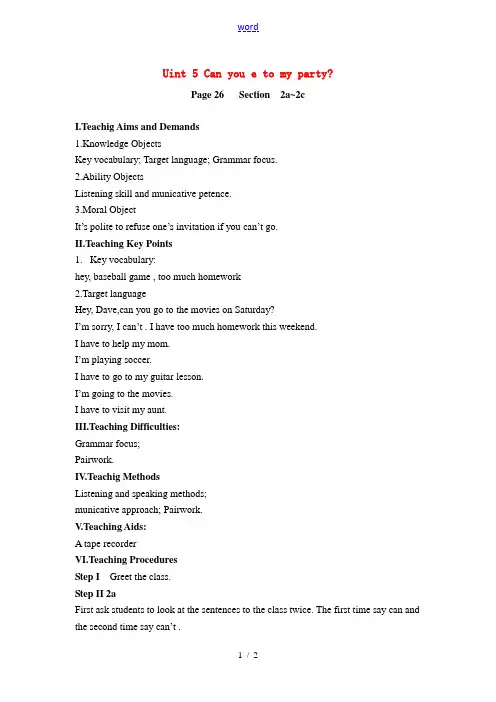
Uint 5 Can you e to my party?Page 26 Section 2a~2cI.Teachig Aims and Demands1.Knowledge ObjectsKey vocabulary; Target language; Grammar focus.2.Ability ObjectsListening skill and municative petence.3.Moral ObjectIt’s polite to refuse one’s invitation if you can’t go.II.Teaching Key Points1.Key vocabulary:hey, baseball game , too much homework2.Target languageHey, Dave,can you go to the movies on Saturday?I’m sorry, I can’t . I have too much homework this weekend.I have to help my mom.I’m playing soccer.I have to go to my guitar lesson.I’m going to the movies.I have to visit my aunt.III.Teaching Difficulties:Grammar focus;Pairwork.IV.Teachig MethodsListening and speaking methods;municative approach; Pairwork.V.Teaching Aids:A tape recorderVI.Teaching ProceduresStep I Greet the class.Step II 2aFirst ask students to look at the sentences to the class twice. The first time say can and the second time say can’t .Listen to the conversations carefully and then circle the word “can”or “can’t ”. Check the answers with the whole class.Step III 2bAsk a student to read the five sentences in Activity 2b.Listen to the recording again and fill in the three numbers as they listen.Step IV 2c PairworkAsk students if they can give other reasons besides the lists in Activity 2b. (Possible answers : not feeling well, have to babysit, going on a trip.)Look at the sample conversation in the book. Ask a pair of students to read it to the class.A : Hey, Dave,can you go to the movies on Saturday?B : I’m sorry, I can’t . I have too much homework this weekend.A : That’s too bad. Maybe another time.B : Sure, Joe. Thanks for asking.Now work with a partner. One of you is student A and one of you is student B. Student A, invites your partner to do something with you. Student B, say you can’t do it and give a reason.Then change roles.Then ask some pairs of students to present their dialogues to the class.If some pairs do well, give them little presents to praise them.Step V Summary and HomeworkToday we’ve learnt how to say “no”to someone’s invitation and give a reason. After class practice the concersations with you partner.Step VI Blackboard DesignUnit 5 Can you e to my party?has to have toShe ____play basketball. He_____study.They _____go to party. I_____study for a test.Step VII Teaching reflcetion:。
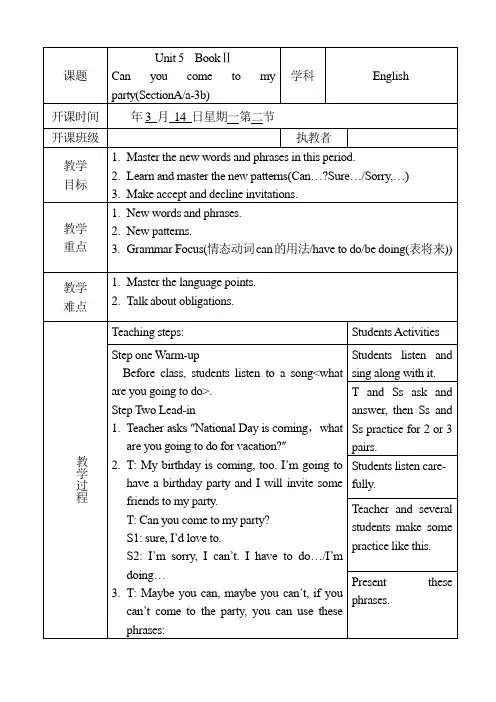
课题Unit 5 BookⅡCan you come to myparty(SectionA/a-3b)学科English开课时间年3 月14 日星期一第二节开课班级执教者教学目标1.Master the new words and phrases in this period.2.Learn and master the new patterns(Can…?Sure…/Sorry,…)3.Make accept and decline invitations.教学重点1.New words and phrases.2.New patterns.3.Grammar Focus(情态动词can的用法/have to do/be doing(表将来))教学难点1.Master the language points.2.Talk about obligations.教学过程Teaching steps: Students Activities Step one Warm-upBefore class, students listen to a song<whatare you going to do>.Step Two Lead-in1.Teacher asks ″National Day is coming,whatare you going to do for vacation?″2.T: My birthday is coming, too. I’m going tohave a birthday party and I will invite somefriends to my party.T: Can you come to my party?S1: sure, I’d love to.S2: I’m sorry, I can’t. I have to do…/I’mdoing…3.T: Maybe you can, maybe you can’t, if youcan’t come to the party, you can use thesephrases:Students listen andsing along with it.T and Ss ask andanswer, then Ss andSs practice for 2 or 3pairs.Students listen care-fully.Teacher and severalstudents make somepractice like this.Present thesephrases.1>have a piano lesson2>study for a test2>help my parents 4>go to the doctor.5>visit my aunt 6>go to a concert.Step Three Practice1.T: Suppose you are going to have a birthdayparty and want to invite some good friends.Practice in pairs and you can use the six phrases.2.Students practice in pairs to practice thenew patterns. Then check some pairs. Step Four Listening and Practice1.Anna’s birthday is coming too, she’s goingto have a birthday party and invite some of her good friends to her party.1>Can they come to the party?Listen and fill in the chart by themselves. Students read them after the teacher and pay attention to the new words. Students work in pairs to practice. Then check some pairs.Students listen to the tape and fill in the blanks with “can’t/can”Name Can’t/can Reasons(原因)JeffMaryMayClaudiaPaul2.Check the answers on by one.3.Listen again and answer: Why can’t theycome to the party?4.Then check the answers carefully one byone.5.(S)Let’s make a report according to thechart.The beginning likes this: After listening, then check the answers one by one.Students listen again and fill in the blanks with the reasons.Students say out the reasons教学过程Sample: A ReportAnna’s birthday is coming, she is going tohave a party and she’ll invite some of her friendsto come to her party. But Jeff can’t come to heparty, because…6. Then check some students’ reports.Step Five Read and LearnSB Page 27. 3a and 3b.Birthday InvitationIt’s a Birthday Party!For whom: LisaTime: Friday, June 30, at four thirty.Place: Lisa’s house, 15th Street.Come and have fun!Lisa: Hi, Simon,you come to my?Simon: is it?Lisa: It’sat.Simon: Great! I’d love to.Students make areport according tothe chart.Check somestudentsAsk students to readthis invitation care-Fully and completethe conversation.Then check theanswers to them oneby one.6.Read and complete the conversationcarefully.7.Check the answers one by one and practicein pairs.Practice it in pairs.Students design theirown cards bythemselves.Students practice thebirthday cards withthe partner.8.Design your own Birthday Invitationaccording to 3a.Birthday InvitationIt’s a !For whom: .Time: .Place: .Come and have fun! Students do some consolidation exercises to consolidate some language points in this period.教学反思9.Then practice in pairs with your partner totalk about your birthday card.Step Six ConsolidationSome consolidation exercises:3.I can’t go to movies. I have to my piano l.4.Sorry, I can’t go to your party, maybe atime.3. They are having a cnext week.4.-Can you (come) to my party, please?-Sorry, I have to(study) for a test.5. Thanks for(ask) us!Two students writethe answers on theBb, the others writeon their exercisebooks.Check the answerscarefully one byone.First ask students tosum up bythemselves, then theteacher adds some.教学过程6.I’m(go) to the movies this Sunday.7. I’d love(come) over to your house to see your parents.8. Whatyou(do) this Sunday? Are you free?9. Lucy can’t(swim). She is too young.10.-Oh, it’s time to have the English party.-(come) and have fun.Step Seven Sum upThis class we have learn:1>word: e.g. concert, lesson, another, whom,2>Some Phrases: have a piano lesson…..3>new patterns:-can you….? (发出邀请)-Sure, I’d love to. (接受邀请)I have to do…-Sorry, I can’t. ﹛I’ m doing…(拒绝邀请)4.Grammars:1) have to do2) be doing sth. (现在进行时表示将来)* “Families and fiends are the biggest happiness for every one!”*教学反思本节课主要以过生日举行生日聚会为主题展开听、说、读等各项活动,一开始由国庆节快到了,引出你将要做什么这一话题,后到我的生日快到了,我将要举办一个生日聚会--邀请朋友到聚会上来--Anna的生日聚会(进行听、说练习)--读Lisa的生日邀请函并做对话--设制自己的生日邀请函并和搭档做练习对话--做相应的巩固练习题--总结本节课的学习内--情感升华--家人和朋友对每个人来说是最大的幸福和快乐!。
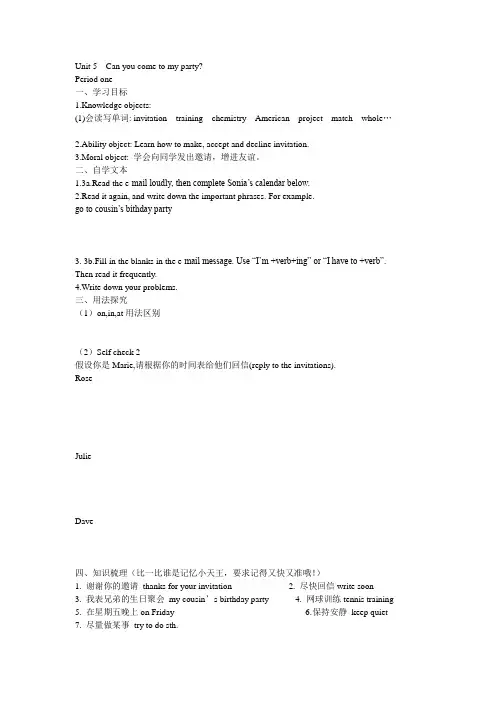
Unit 5 Can you come to my party?Period one一、学习目标1.Knowledge objects:(1)会读写单词: invitation training chemistry American project match whole…2.Ability object: Learn how to make, accept and decline invitation.3.Moral object: 学会向同学发出邀请,增进友谊。
二、自学文本1.3a.Read the e-mail loudly, then complete Sonia’s calendar below.2.Read it again, and write down the important phrases. For example.go to cousin’s bithday party______________________ _______________________________________ __________________________________________ _____________________3. 3b.Fill in the blanks in the e-mail message. Use “I’m +verb+ing” or “I have to +verb”.Then read it frequently.4.Write down your problems.三、用法探究(1)on,in,at用法区别______________________________________________________________________________________(2)Self check 2假设你是Marie,请根据你的时间表给他们回信(reply to the invitations).Rose________________________________________________________________________________________________________________________________________________________________________________________________________________ _______Julie_____________________________________________________________________________________________________________________________________________________________________ __________________________________________________Dave_______________________________________________________________________________ _______________________________________________________________________________ _________________________________________________________四、知识梳理(比一比谁是记忆小天王,要求记得又快又准哦!)1. 谢谢你的邀请thanks for your invitation2. 尽快回信write soon3. 我表兄弟的生日聚会my cousin’s birthday party4. 网球训练tennis training5. 在星期五晚上on Friday6.保持安静keep quiet7. 尽量做某事try to do sth.8.完成地理科目finish the geography project9. 足球比赛football match10. 整天the whole day11.顺便来访come over12. 空闲be free13. 为我的化学考试而学习study for my chemistry五、课后作业(A) 选择( ) 1. Mary can go to the beach ______ Saturday night.A. atB. inC. onD. over( )2. He can’t help his sister. He ______.A. plays volleyballB. is playing volleyballC. plays the volleyballD. is playing the volleyball( )3. Please keep ______! I’m trying to study for a maths test.A. quietlyB. quietC. noisyD. noisily( )4. Thanks for ___________.A. askingB. askC. asksD.asked( )5. The children had a soccer game ______ the morning.A. inB. atC. on D . about()6.What do you usually do _______ Saturdays? A. at B. on C. in D.with(B) 用所给词的适当形式填空或根据首字母填空。
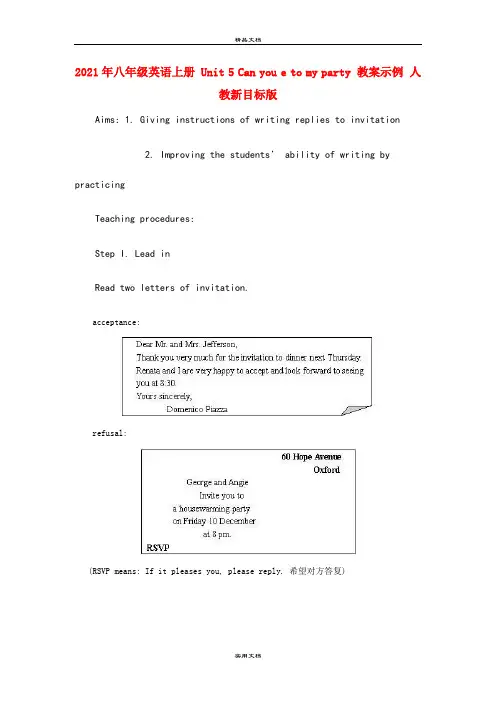
2021年八年级英语上册 Unit 5 Can you e to my party 教案示例人教新目标版Aims: 1. Giving instructions of writing replies to invitation2. Improving the students’ ability of writing by practicingTeaching procedures:Step I. Lead inRead two letters of invitation.acceptance:refusal:(RSVP means: If it pleases you, please reply. 希望对方答复)Step II. Writing Tips在接到某人的邀请信以后,我们可以回信来表示接受或拒绝对方的邀请。
在回信表示接受对方的邀请时,我们要首先表达出对于对方邀请的感谢,并表示自己愿意接受这一邀请,最后表达一下自己参加这次聚会或其他活动的迫切心情。
因此接受对方邀请的信包括以下三部分:—— thanks—— acceptance—— expression of feeling在回信表示拒绝对方的邀请时,我们要先表达出自己对于对方邀请的感谢以及自己愿意参加该项活动的愿望,然后表示自己很抱歉,婉转地拒绝并写出拒绝的原因,最后还可以表达出自己对此项活动成功的希望和祝愿。
拒绝对方邀请的信包括以下三部分:—— thanks—— apology + reason—— wish在拒绝对方的邀请时,要使用婉转、客气的拒绝用语,同时要写出可以被人接受的拒绝理由。
Step III. Useful expressionsWhen you have to refuse an invitation it is usual to use a “softening” phrase followed by a reason for refusing. Here are four different ways to refuse the invitation politely.I’d love to e, but I can’t, because….I’m very sorry I cannot e to your 21st birthday party next week. I’m going….I’m afraid I will not be able to…. because….I’m really sorry to say / tell you that …. because….Step IV. PracticeStudy the list below and decide with a partner which reasons are acceptable and which are unacceptable. Put a tick or a cross beside each reason.(讨论下列拒绝邀请的理由,在认为是正当的理由旁划√,在认为是不正当的理由旁划X)going to the theatre that evening ( )cooking supper that evening ( )attending a lecture that evening ( )visiting a friend in hospital that evening ( )watching television that evening ( )taking an exam the next day ( )taking the dog for a walk that evening ( )Work in pairs and tell each other how you will refuse the following invitation politely.Your teacher has asked you to go to his house for dinner next Sunday.Your classmate has asked you to go to a movie with her tomorrow evening.Your uncle and aunt asked you to their housewarming party on Sunday morning.Your friend has asked you to her 21st birthday party next Friday.Your cousin has asked you to her wedding this Saturday.Your former classmate has invited you to a Christmas party on Christmas Day.Step V Writing tasksRead the following invitation letter and find out why Claudia and Sonia are having a party.Jenny, Paul and Anna all received the invitation to Claudia and Sonia’s party on 20th March. Which of them can go to the party? Look at the pages from their diaries and then plete the box below. (Jenny, Paul and Anna 都接到了参加3月20日Claudia and Sonia 举行的聚会的邀请。
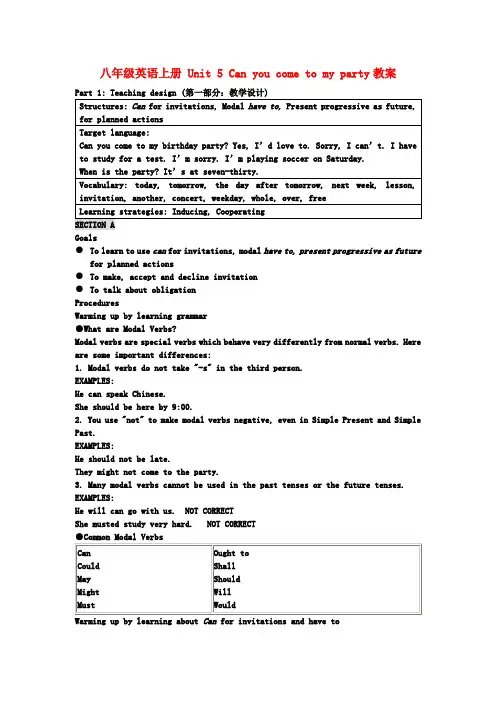
八年级英语上册 Unit 5 Can you come to my party教案Goals●To learn to use can for invitations, modal have to,present progressive as futurefor planned actions●To make, accept and decline invitation●To talk about obligationProceduresWarming up by learning grammar●What are Modal Verbs?Modal verbs are special verbs which behave very differently from normal verbs. Here are some important differences:1. Modal verbs do not take "-s" in the third person.EXAMPLES:He can speak Chinese.She should be here by 9:00.2. You use "not" to make modal verbs negative, even in Simple Present and Simple Past.EXAMPLES:He should not be late.They might not come to the party.3. Many modal verbs cannot be used in the past tenses or the future tenses. EXAMPLES:He will can go with us. NOT CORRECTShe musted study very hard. NOT CORRECTWarming up by learning about Can for invitations and have toWarming up by talking about the partyHello, everyone!Today we shall take up unit 5. The title of this unit is that Can you come to my party?Do you like parties? I think most of you will say,” Yeah”. At the party we have lots of fun eating, drinking, singing, dancing and talking. And we can also make new friends. But how do you answer when someone asks you to take part in a party? If you want to go to the party,you can say,”Sure, I’d love to.”If you have to do some other things at the same time, you can say,“I’m sorry.I have to -----.”Please look at the blackboard and read after me the target language for this unit. When you read, pay attention to the structure of the sentence.time it is offered. In such places people usually thank the person but do not givea definite answer at that time. But in the United States it is polite to accept or refuse an invitation the first time it is offered. Also, Americans usually give a reason when they have to say no to an invitation.1A: Matching the words with the picturesPlease look at the picture on page 25. The boy in the middle will hold a party. Can everyone come to the party? Each thought bubble shows a person doing something. Please tell me what you see in each scene. And then look at the blackboard and checkPlease read these phrases loudly. Now write letters of the correct picture in the1b Listening and writingYou are great! As you see, there are some people in the picture. Do you know who’s who? Now please listen to the conversation. Especially listen to Sun Ning’s words carefully. He says the names of each person he is inviting. When I play the recording for the first time, you just listen carefully. When I play the recording for the second time, please write the names of each person next to his or her picture. YouTapescriptmodal have to and present progressive as future, for planned actions.1c Practicing oral English using the languageNow please make your own dialogues in groups of four. Suppose you are the students in the picture. One of you is students A inviting the other three students to your party. The other students are B, C and D, saying if you can go or not. If you can’t go, remember to give a reason.offer vocabulary and pronunciation support if you need.2a Listening and understandingNow let’s go to page 26. Please look at these five sentences, and read them. The first time say can and the second time say can’t.Do you know which one is correct? Let’s listen to the tape. There are five conversations numbered 1 to 5. In each conversation the person says he can or he can’t come to the party. Listen to each conversation carefully and circle the word that makes the sentences correct. For example, the word can’t have a circle around it in sentence1. So sentence1 is Jeff can’t come to the party. I will play the recording twice. First time you just listen carefully and the second time please circle can or can’t.2b Listening and numberingYou have heard the conversations twice and have got to know who can come to the party and who can’t come to the party. But why can’t those three persons come? Here are five reasons. Which are correct ones? Please listen to the tape again and write the number of the conversation (1 to 3) in front of the reasons. Two of them are not in the recording. These two have no answer. Listen again and check your answers.Now from 2b we come to know the reasons why people can’t come to the party. Thinkwork with your partner. One of you is student A and one of you is student B. Student A, invite your partner to do something with you. Student B, say you can’t do it and give a reason. Then switch roles.3a Reading the article and filling the blanksPlease look at 3a. There is an invitation here. What kind of invitation is it? Who is having a birthday party? Good, you are great. Now look at the dialogue and tryplease pay attention to the pronunciation and intonation. Then please read together loudly.3b Doing pairworkNow practice the conversation you just completed with your partner. You should each have a turn being Simon. Now look at the blank invitation card and please think of any other events, such as music concert, art festival, and so on. You can fill out the cards with your own ideas.Then you can invite each other to your events.Read the sample dialogue and shadow the can for invitations, modal have to and present progressive as future, for planned actions.Then I will ask some pairs to present your conversations to the class.4 Inviting a friendNow let’s play a game in pairs. You and your partner decide who is A and who isB. Student A, you are Elisa, and look at this page. Student B, you are Lu Qing andlook at page 82. Elisa will invite Lu Qing to go to the mall. Read the sample dialoguetogether. Then look at the calendar and ask more questions to learn when they bothcan go to the mall. Find a time when they are both not busy. You can use the dialogueHow do you make, accept and decline invitations?You can make, accept and decline invitations as follows:*Can you come to my party?*Sure, I’d love to.*Sorry, I can’t. I’m going to the concert.*I’m sorry, I can’t, either. I have to go to the doctor.SECTION BGoals●To revise the days of the week●To learn the new words: today, tomorrow, the day after tomorrowProcedures1aWriting the datesWelcome back to the English class. Do you know what day is it today? Yes, it isWednesday today. And today we will study Section B. Please look at the top of thecalendar in your book and read these words aloud. Do you remember them?(Sunday, Monday, Tuesday, Wednesday,Thursday, Friday, Saturday) Good! Look at the blackboard please. Here is a current calendar. Mary, please pointout today’s date. Yes, it’s 12th October. What about the other dates of this week?Now please copy these numbers into the calendar in your books. Let’s see who canget the right answer.Then I’ll ask some of you to read each day’s date to the class. The sample is: It’s Sunday, the 9th.1b Writing daysPlease look at the calendar again. As you see, today is Wednesday the 12th. LookRead these words loudly and write them in the correct spaces on the calendar inI’ll ask a student to fill in the blank on the board and the rest of you can check your answers against those on the board.1c Doing pairwork and playing gamesNow look at the dialogue in 1c. Tom and Tim please read it to the class aloud. Then make the similar dialogue in pairs. One student points to a date and asks,What’s today? The other one answers, It’s (Monday) the (10th).After finishing practicing, let’s play the game of speed. Please look at the calendar on the board and listen carefully. When I point to a date on the calendar and say yesterday, today and tomorrow, I’ll say a student’s name. This student has to respond within five seconds with the correct date. For example, if I say (yesterday) and point to (Wednesday, the 12th) this student has to say, (It’s Tuesday, the 11th). Now let’s play this game and see how fast you can respond with correct answers. Let’s find who the champion is.2a Listening and circlingLook at the picture on page28. Please tell me what you see in the picture. And what is the boy doing? Yes, he’s talking on the phone. He’s talking to Vince. Can Vince play tennis with Andy? Let’s listen to the tape. I’ll play the recording twice. When I play the first time, you just listen carefully. When I play the second time, circle yes if Vince can play with Andy or circle no if Vince can’t.The answer is: NOmodal have to and present progressive as future, for planned actions.2b Listening and writingNow you have known Vince can’t play tennis with Andy, and he is very busy these days. What is Vince going to do on these days? Please look at the chart in your book. Here are Vince’s activities, and three letters a, b, c stand for today, tomorrow and the day after tomorrow. Listen to the tape again. This time please write the letters a, b or c in front of each activity to show which one happens today, which one happens tomorrow and which one happens the day after tomorrow. The sample answer is given. Number 1 is b. That means Vince is playing soccer tomorrow.2c Doing pairworkNow practice the dialogue in pairs. One student plays Andy and asks Vince to play tennis. The other one plays Vince, says no and gives reasons. I’ll give you a few minutes to practice, and then I’ll ask som e pairs to present the conversations3a Reading and writingLook at 3a please. Here is an e-mail message from Sonia. Read it aloud. When you are reading , please pay attention to the pronunciation and intonation.Read the e-mail message a second time to slash / the sentences, underline the expressions and shaow the c an for invitations, modal have to and present progressiveNow look at the blank calendar, there are seven days of the week. What happens on each day? Read the message again and complete Sonia’s calendar. Let’s check the3b Reading and writingHere is another e-mail message from Tony to Henry. Read it and help him completeNow write your own e-mail message to a friend. You are telling why you can’t visithim next week. You can give any reasons you wish. After you finish writing, I’ll ask some of you students to read your messages to the class.4 Closing up by doing groupworkPlease turn to page 83 and look at the calendar. What are you doing on Monday? Tuesday? … Now write down all the things you have to do next week. Then look at your list. On what day are you free? This is when you can have your party. Next ask your partners in your groups if they can come to your party at the time youNow let’s ask some students to tell us when their party is and if the classmates they invited can come to their party.SELF CHECKGoals:●To revise the key words of this unit●To practice writing1Filling the blanksFill in the blanks with the words given. Change the form of the word if necessary.2 Imaging and writingImagine you are Marie. Read the invitations on page 30 and look at your schedule if you can attend these activities. And then write replies to the invitations. ▲I’m sorry, Rose. I can’t play tennis with you because I’ll go fishing with grandpa the whole day on Saturday.▲Sorry, Julie. I’ll finish the geography project on Monday evening. So I can’t go to your party.▲Sorry, Dave. On Thursday evening I have a piano lesson. Can we discuss it on Friday?Just for fun!Sing a song in English:Are you sleeping?Are you sleeping, are you sleeping?brother John, brother John?Morning bells are ringing, morning bells are ringingding ding dong, ding ding dongPart2: Teaching Resources(第二部分:教学资源)I. Background readingsAmerican Holidays and Observances1. anotheradj. 1. 再一;再 one more: Here comes another bus. 又来了一辆公共汽车。
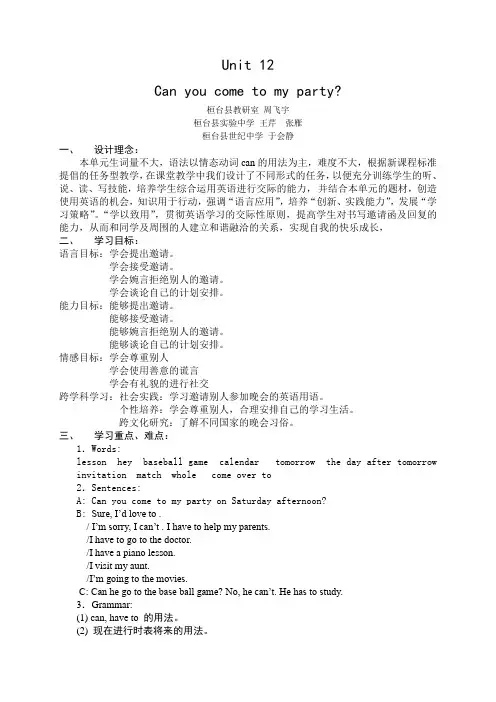
Unit 12Can you come to my party?桓台县教研室周飞宇桓台县实验中学王芹张雁桓台县世纪中学于会静一、设计理念:本单元生词量不大,语法以情态动词can的用法为主,难度不大,根据新课程标准提倡的任务型教学,在课堂教学中我们设计了不同形式的任务,以便充分训练学生的听、说、读、写技能,培养学生综合运用英语进行交际的能力,并结合本单元的题材,创造使用英语的机会,知识用于行动,强调“语言应用”,培养“创新、实践能力”,发展“学习策略”。
“学以致用”,贯彻英语学习的交际性原则,提高学生对书写邀请函及回复的能力,从而和同学及周围的人建立和谐融洽的关系,实现自我的快乐成长,二、学习目标:语言目标:学会提出邀请。
学会接受邀请。
学会婉言拒绝别人的邀请。
学会谈论自己的计划安排。
能力目标:能够提出邀请。
能够接受邀请。
能够婉言拒绝别人的邀请。
能够谈论自己的计划安排。
情感目标:学会尊重别人学会使用善意的谎言学会有礼貌的进行社交跨学科学习:社会实践:学习邀请别人参加晚会的英语用语。
个性培养:学会尊重别人,合理安排自己的学习生活。
跨文化研究:了解不同国家的晚会习俗。
三、学习重点、难点:1.Words:lesson hey baseball game calendar tomorrow the day after tomorrow invitation match whole come over to2.Sentences:A: Can you come to my party on Saturday afternoon?B: Sure, I’d love to ./ I’m sorry, I can’t . I have to help my parents./I have to go to the doctor./I have a piano lesson./I visit my aunt./I’m going to the movies.C: Can he go to the base ball game? No, he can’t. He has to study.3.Grammar:(1) can, have to 的用法。
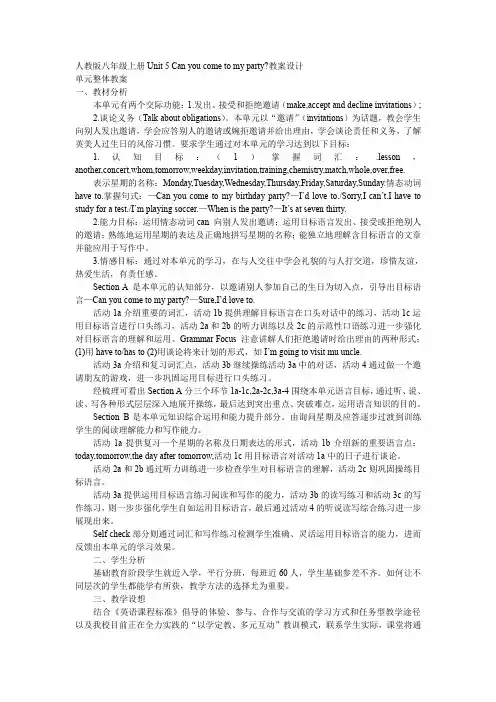
人教版八年级上册Unit 5 Can you come to my party?教案设计单元整体教案一、教材分析本单元有两个交际功能:1.发出、接受和拒绝邀请(make,accept and decline invitations);2.谈论义务(Talk about obligations)。
本单元以“邀请”(invitations)为话题,教会学生向别人发出邀请,学会应答别人的邀请或婉拒邀请并给出理由,学会谈论责任和义务,了解英美人过生日的风俗习惯。
要求学生通过对本单元的学习达到以下目标:1.认知目标:(1)掌握词汇:.lesson,another,concert,whom,tomorrow,weekday,invitation,training,chemistry,match,whole,over,free.表示星期的名称:Monday,Tuesday,Wednesday,Thursday,Friday,Saturday,Sunday.情态动词have to.掌握句式:—Can you come to my birthday party?—I’d love to./Sorry,I can’t.I have to study for a test./I’m playing soccer.—When is the party?—It’s at seven thirty.2.能力目标:运用情态动词can 向别人发出邀请;运用目标语言发出、接受或拒绝别人的邀请;熟练地运用星期的表达及正确地拼写星期的名称;能独立地理解含目标语言的文章并能应用于写作中。
3.情感目标:通过对本单元的学习,在与人交往中学会礼貌的与人打交道,珍惜友谊,热爱生活,有责任感。
Section A 是本单元的认知部分,以邀请别人参加自己的生日为切入点,引导出目标语言—Can you come to my party?—Sure,I’d love to.活动1a介绍重要的词汇,活动1b提供理解目标语言在口头对话中的练习,活动1c运用目标语言进行口头练习,活动2a和2b的听力训练以及2c的示范性口语练习进一步强化对目标语言的理解和运用。
八年级英语上册《Can you e to my party?》教案人教版教学目标:1. 能够听懂、会说、会读本课的生词和短语。
2. 能够正确使用情态动词can和must提问和回答。
3. 能够理解并在适当的情境中运用本课的主要句型。
4. 能够描述日常活动,并能用英语邀请他人参加活动。
教学内容:第一章:课堂导入1.1 教师与学生互相问候,导入新课。
1.2 回顾上一课的内容,为新课的学习做好铺垫。
第二章:生词和短语学习2.1 教师展示本课的生词和短语,引导学生跟读。
2.2 学生通过例句理解生词和短语的意思。
第三章:句型学习3.1 教师展示本课的主要句型,引导学生跟读。
3.2 学生通过例句理解句型的用法。
第四章:听力练习4.1 教师播放听力材料,学生听懂并回答问题。
4.2 学生模仿听力材料中的对话,进行角色扮演。
第五章:口语练习5.1 学生两人一组,用所学的句型进行对话。
5.2 学生向全班展示他们的对话,教师给予评价和指导。
教学评估:1. 课堂参与度:观察学生在课堂上的积极参与情况。
2. 听力理解能力:通过听力练习,评估学生的听力理解能力。
3. 口语表达能力:通过口语练习,评估学生的口语表达能力。
教学资源:1. 课本和练习册。
2. 听力材料。
3. 教学PPT。
教学步骤:1. 课堂导入:教师与学生互相问候,导入新课。
2. 生词和短语学习:教师展示本课的生词和短语,引导学生跟读,学生通过例句理解生词和短语的意思。
3. 句型学习:教师展示本课的主要句型,引导学生跟读,学生通过例句理解句型的用法。
4. 听力练习:教师播放听力材料,学生听懂并回答问题,学生模仿听力材料中的对话,进行角色扮演。
5. 口语练习:学生两人一组,用所学的句型进行对话,学生向全班展示他们的对话,教师给予评价和指导。
教学反思:在课后,教师应反思本节课的教学效果,包括学生的参与度、听力理解能力和口语表达能力等方面,以便在今后的教学中进行改进。
第六章:语法讲解6.1 教师讲解情态动词can和must的用法。
Unit 5 Can you come to my party教案示例Aims: 1. Giving instructions of writing replies to invitation
2. Improving the students’ ability of writing by practicing
Teaching procedures:
Step I. Lead in
Read two letters of invitation.
acceptance:
refusal:
(RSVP means: If it pleases you, please reply. 希望对方答复) Step II. Writing Tips
在接到某人的邀请信以后,我们可以回信来表示接受或拒绝对方的邀请。
在回信表示接受对方的邀请时,我们要首先表达出对于对方邀请的感谢,并表示自己愿意接受这一邀请,最后表达一下自己参加这次聚会或其他活动的迫切心情。
因此接受对方邀请的信包括以下三部分:
—— thanks
—— acceptance
—— expression of feeling
在回信表示拒绝对方的邀请时,我们要先表达出自己对于对方邀请的感谢以及自己愿意
参加该项活动的愿望,然后表示自己很抱歉,婉转地拒绝并写出拒绝的原因,最后还可以表达出自己对此项活动成功的希望和祝愿。
拒绝对方邀请的信包括以下三部分:
—— thanks
—— apology + reason
—— wish
在拒绝对方的邀请时,要使用婉转、客气的拒绝用语,同时要写出可以被人接受的拒绝
理由。
Step III. Useful expressions
When y ou have to refuse an invitation it is usual to use a “softening” phrase followed by a reason for refusing. Here are four different ways to refuse the
invitation politely.
I’d love to come, but I can’t, because,.
I’m v ery sorry I cannot come t o your 21st birthday party next week. I’m g oing,.
I’m afraid I will not be able to,. because,.
I’m really sorry to say / tell you that ,. because,.
Step IV. Practice
Study the list below and decide with a partner which reasons are acceptable and which are unacceptable. Put a tick or a cross beside each reason.(讨论下列拒绝邀请的理由,在认为是正当的理由旁划√,在认为是不正当的理由旁划X)
going to the theatre that evening ( )
cooking supper that evening ( )
attending a lecture that evening ( )
visiting a friend in hospital that evening ( )
watching television that evening ( )
taking an exam the next day ( )
taking the dog for a walk that evening ( )
Work in pairs and tell each other how you will refuse the following invitation politely.
Your teacher has asked you to go to his house for dinner next Sunday.
Your classmate has asked you to go to a movie with her tomorrow evening.
Your uncle and aunt asked you to their housewarming party on Sunday morning.
Your friend has asked you to her 21st birthday party next Friday.
Your cousin has asked you to her wedding this Saturday.
Your former classmate has invited you to a Christmas party on Christmas Day.
Step V Writing tasks
Read the following invitation letter and find out why Claudia and Sonia are
having a party.
Jenny, Paul and Anna all received the invitation to Claudia and Sonia’s party on 20th March. Which of them can go to the party? Look at the pages from their diaries and then complete the box below. (Jenny, Paul and Anna 都接到了参加3月20日Claudia and Sonia 举行的聚会的邀请。
看一下他们这一周的安排,在下面的表中标出他们是否能参
加)
Jenny
Paul
Anna
Group work:
Divide the students into 3 groups.
Work with a partner and write Paul’s letter correctly. Put it in the correct
order, punctuate the letter properly, put the verbs into the correct tense and write the address in the correct position. (把信中的句子按顺序安排好,加上标点,使用动
词的适当时态,并把地址写在正确的位置上。
)
His address is: Flat 6, Cadogan House, Milton Keynes, Bucks
see you soon
Paul
i hope everything (be) wonderful and everybody (have) a good time
dear Claudia and sonia
i (be) very sorry, i cannot (come) to your party next month as i (go) on
holiday on tuesday for a fortnight
thank you for the invitation
(2) Work with a partner to complete Anna’s letter. Use the information in her diary to help you. (借助Anna一周的时间安排表来完成她给Claudia and Sonia的回信)
Suppose you are Marina, write a polite refusal of the
invitation.
At the moment you are living at 22, Morgan House, Montague Street, London CW
2. You have just received the following invitation for a good friend, but you cannot accept it because you will be flying to Berlin on 4th November.。